Pixel 9a vs Pixel 7a preliminary comparison: Just two years, but the evolution is massive
We may earn a commission if you make a purchase from the links on this page.

Intro
The Pixel "a" series is a fan favorite since its first iteration. How can it not be, when it offers so much of the flagship Pixel experience for a price that is a few hundred bucks lower than the high-end Pixels Google sells.
Google just announced the Pixel 9a, which continues the series' legacy of being one of the best bang for your buck phones on the market. It has a starting price of $499, which is—impressively—the same price that the Pixel 7a went for in 2023.
Despite costing the same, one can make the argument that the Pixel 9a sounds like twice the device its predecessor from 2023 is, so if you are a Pixel 7a owner, you might catch yourself asking: "Is it time to upgrade?"
Pixel 9a vs Pixel 7a differences:
| Pixel 9a | Pixel 7a |
|---|---|
| Tensor G4 | Tensor G2 |
| Supports Best Take, Audio Eraser, Gemini Live | A more limited AI feature portfolio |
| 6.3-inch OLED display | 6.1-inch OLED display |
| 120Hz display refresh rate | 90Hz display refresh rate |
| 2700 nits peak brightness | 2000 nits peak brightness |
| 48MP main camera | 64MP main camera |
| 5100 mAh battery (longest battery life on a Pixel) | 4385 mAh battery |
| New camera island and body | OG camera bar and oval shape |
| IP68 rating | IP67 rating |
| Colors: Obsidian, Porcelain, Iris, Peony | Colors: Charcoal, Snow, Sea, Coral |
Table of Contents:
Read more:
Design and Size
You can barely make the connection
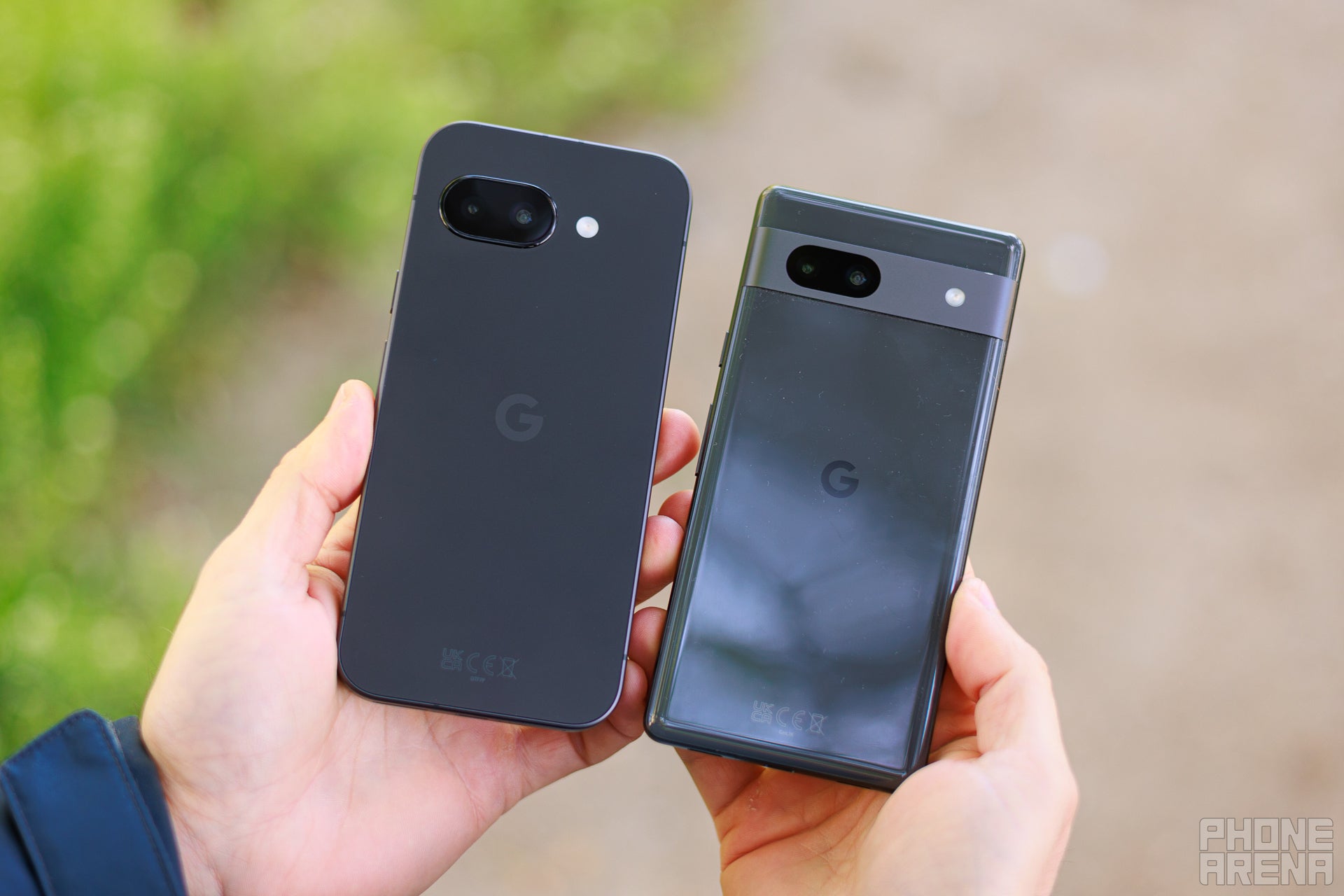
Image by PhoneArena
Google is moving away from the iconic camera bar design that made the Pixel 7a and other Pixel phones stand out. The new "a" series comes with a flush camera module that barely sticks out of the back panel. The two cameras are still positioned on the top left side of the back, but the flash is now outside the camera module.
Unlike the Pixel 7a that has rounded corners and sides, the Pixel 9a has the more flat and boxy shape introduced with the Pixel 8a last year. Combined with a more understated camera, the 9a looks like a completely different phone in comparison to the Pixel 7a.
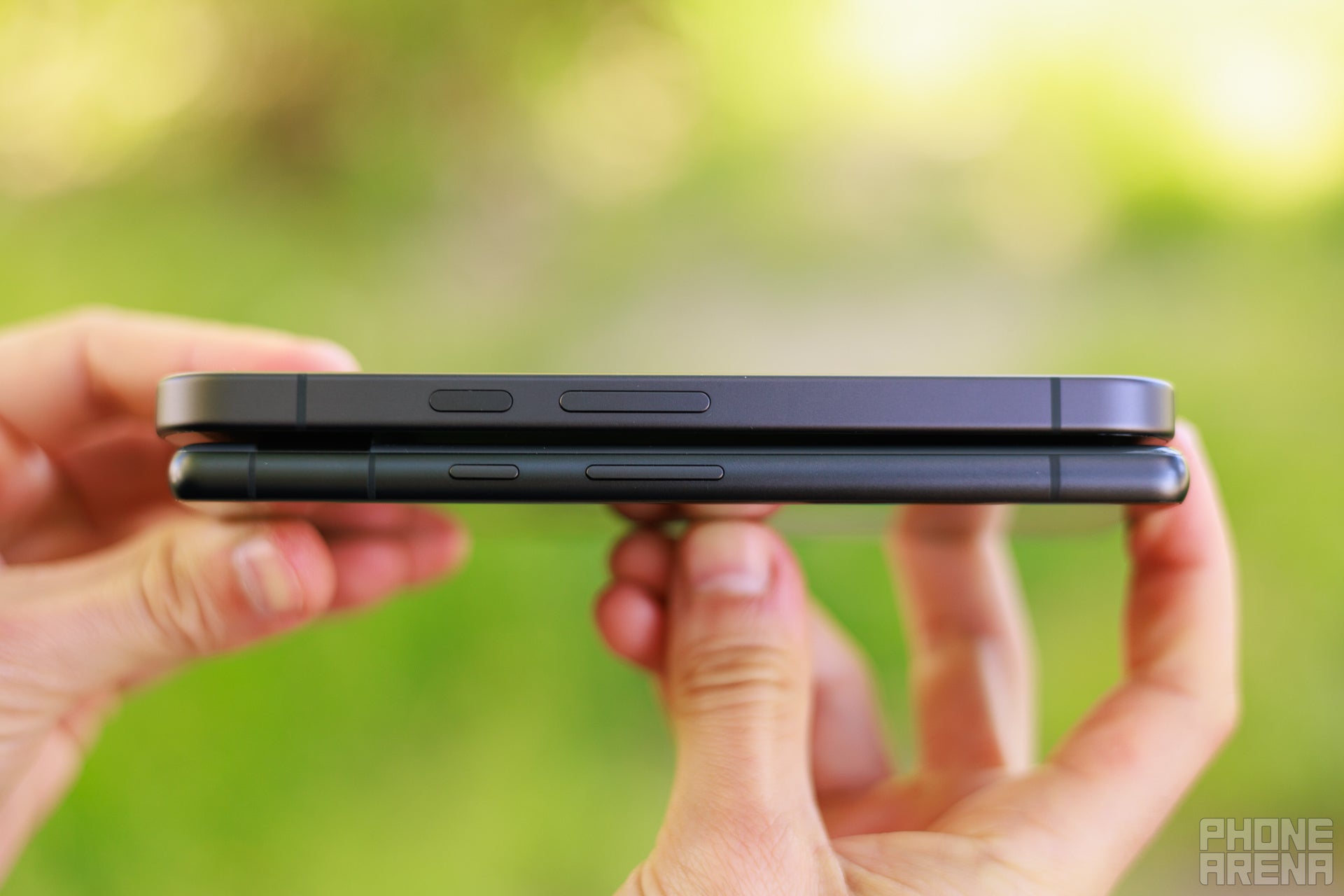
Image by PhoneArena
The dimensions are also different, with the 9a being a bit larger than the 7a (likely to accommodate the larger battery). The exact dimensions are 154.7 x 73.3 x 8.9 mm with a weight of 186 g vs the 152 x 72.9 x 9 mm and 193.5 g of the Pixel 7a.
Google has not upgraded the "a" series with a glass back, but the 9a's plastic back is made with 81% recycled content, which is the most on any of Google's budget phones to date. The frame is aluminum, just like with the 7a.
Durability has been improved on the 9a too, with an IP68 water and dust resistance rating compared to the IP67 certification on the Pixel 7a. This is not exactly the most meaningful upgrade as the difference between the two certifications is not significant, but it is nice to have that extra peace of mind.
As for the color options, the Pixel 9a comes in:
- Obsidian
- Porcelain
- Iris
- Peony
The Pixel 7a came in:
- Charcoal
- Snow
- Sea
- Coral
Display Differences
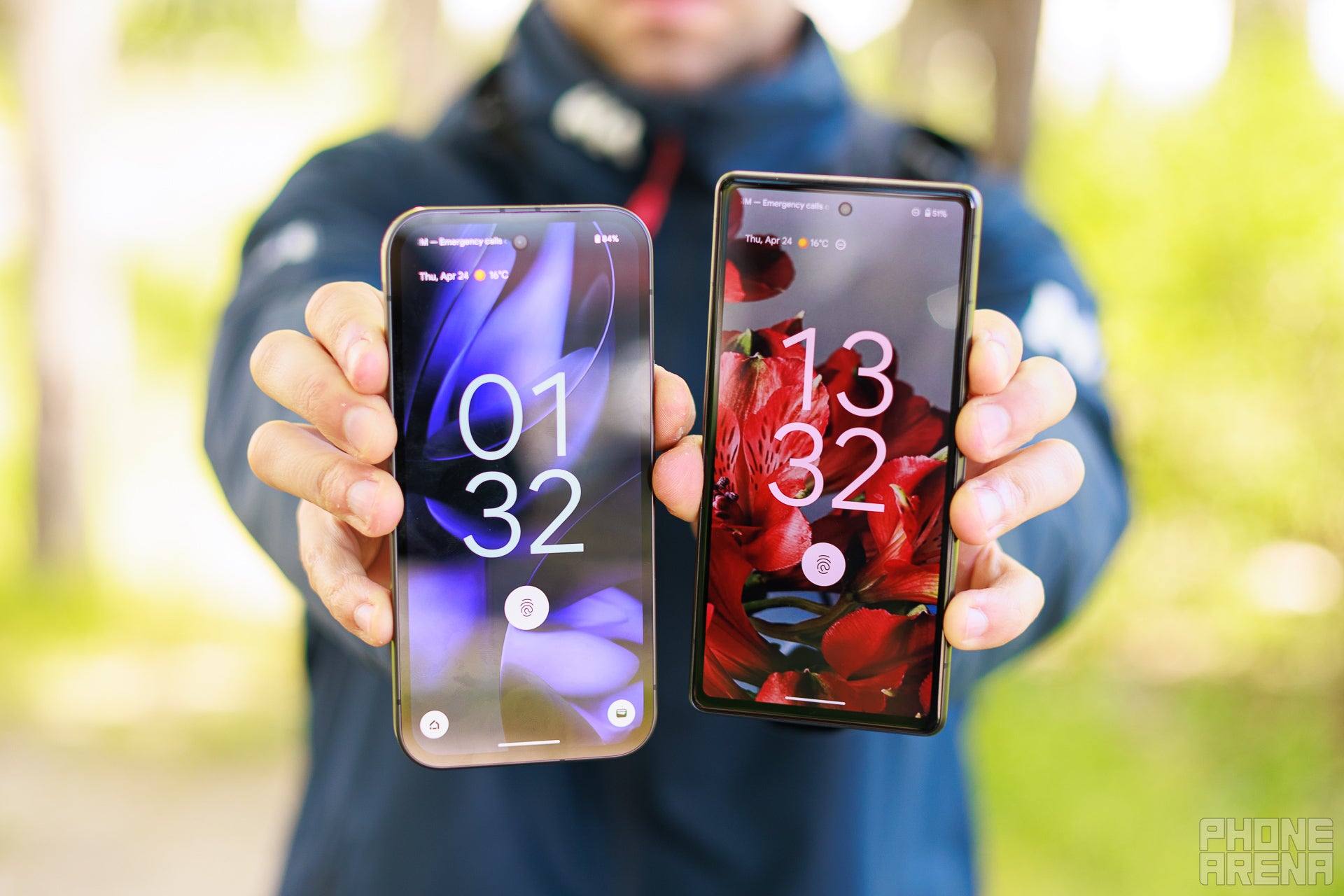
Image by PhoneArena
The Pixel 9a has almost symmetrical bezels around a larger 6.3-inch screen (vs 6.1 inches on the 7a). The display is now capable of a smoother 120Hz refresh rate vs the 90Hz on the predecessor, and gets brighter at 2700 nits vs 2000 nits of peak brightness.
The thinner and more uniform bezels, the higher brightness and refresh rate—all of these changes transform the Pixel 9a into a genuinely more modern phone in comparison to the 7a. And that's even more true when you factor in the new design.
Google did not mention any changes to the fingerprint sensor embedded in the display. The Pixel 7a, like other older Pixels, is known for its unreliable fingerprint sensor, and this didn't really get much better with last year's model.
The Pixel 7a is not bad for its time, but the 9a has double the display brightness, matching and even beating some of the flagship phones on the market! We had no trouble using the new model under direct sunlight, where the older one sometimes made us squint our eyes.
Performance and Software
Double the performance
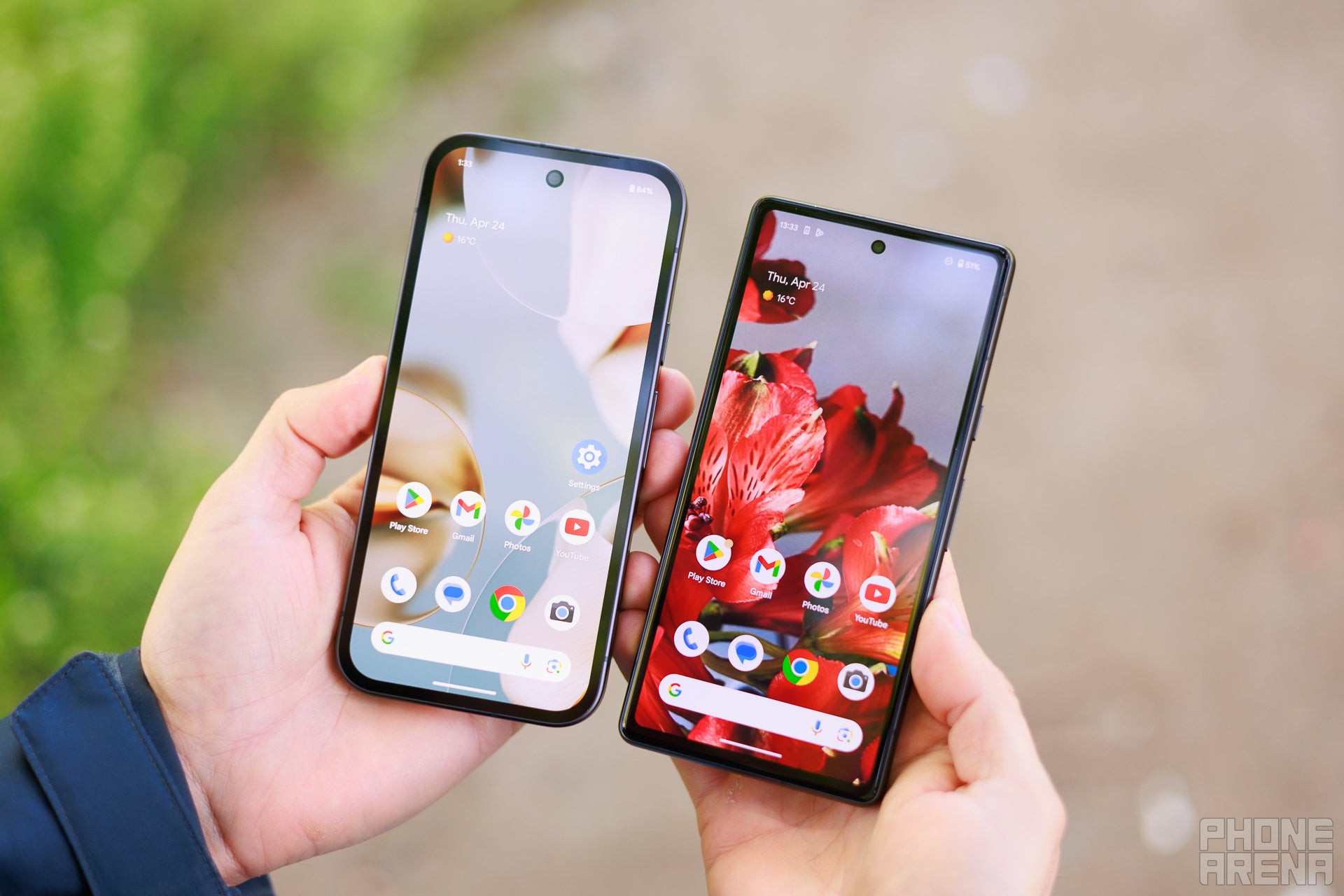
Image by PhoneArena
Besides the new design and improved display specs, another greatly improved area is the performance. The Pixel 9a sports Google's Tensor G4 chipset, the same processor that powers the rest of the Pixel 9 series.
For context, Google claims that the Tensor G4 is on average 30% faster for web browsing compared to the Tensor G3.
The Tensor G4 is also considerably more power-efficient compared the Tensor G2 of the 7a.
The RAM is still 8 GB, just like on the Pixel 7a, but there's an additional 256 GB storage variant. In contrast, the Pixel 7a was only available in 128 GB.
Software-wise, the Pixel 9a comes with Android 15 out of the box, with seven years of OS and security updates, matching Google’s latest policy. On the other hand, the Pixel 7a, which launched with Android 13 and comes with 5 years of software support is expected to stop at Android 18.
You have access to Gemini Live on both phones, but the 9a supports the new feature called Gemini Live Video and the ability to screen-share with Gemini.
Gemini Live Video allows users to turn on their camera and "show" Gemini something they want to ask it about. For example, you can show Gemini a pair of jeans, and ask it what other piece of clothing would go well with them. Screen Sharing is pretty self explanatory: instead of showing what's in front of you, you share what's on your screen.
CPU Performance Benchmarks:
There is an increase in CPU performance, but it is not that significant, and definitely not noticeable during everyday use.
GPU Performance
The GPU performance is where the Pixel 9a really shows its new-phone status. It is a far more capable phone when it comes to any kind of image processing and more intense mobile gaming. The 9a also heats up less, which helps with thermal throttling.
Camera
New main camera, possibly the same as Pixel 9 Pro Fold
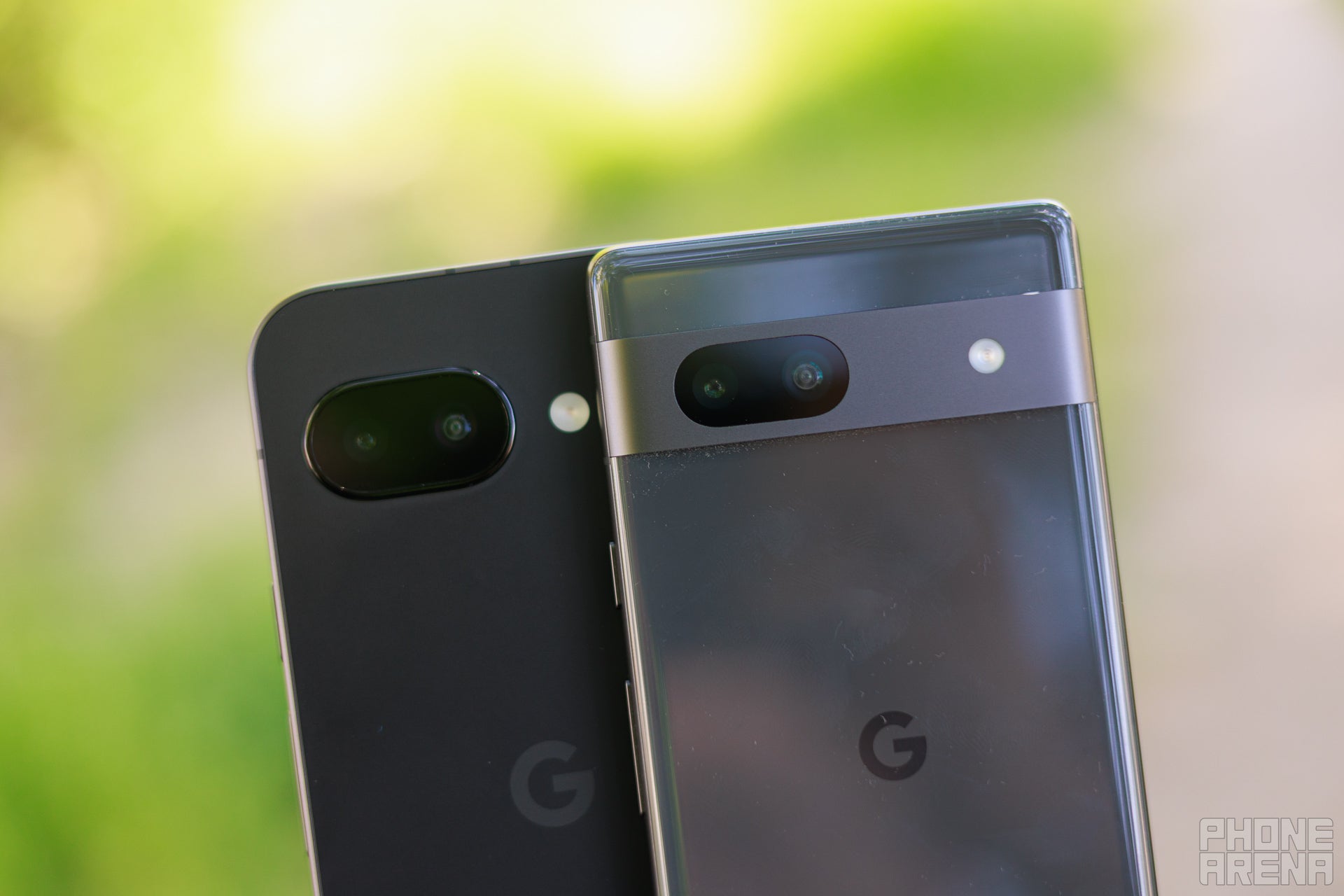
Image by PhoneArena
The look that Pixel cameras achieve is one of the main reasons people buy them, and while usually it's not exactly on par with the flagship models, the "a" series has sometimes come pretty close in terms of image quality.
For the last couple of years, Google has stuck with the same 64 MP main camera that debuted with the Pixel 7a, but now the company has dropped that image sensor and replaced it with a new 48 MP one.
Interestingly, the 9a's 48 MP main camera specs sound a lot like those of the Pixel 9 Pro Fold's:
- ƒ/1.7 aperture
- 1/2" image sensor size
- Optical + electronic image stabilization
PhoneArena Camera Score:
Interestingly, the camera performance is not that different between the Pixel 9a and 7a, despite the upgrades. We found it to be rather similar both for taking photos and recording video.
Something worth mentioning is that features like Best Take, Add Me, or Audio Magic Eraser are not available on the Pixel 7a. But what's arguably more exciting is the fact that the 9a supports Macro Focus—a first for the "a" series. What makes Macro Focus even better news is that it supports 4K video recording!
The 9a does a better job as far as HDR goes, revealing more details in the shadows without overexposing the highlights.
Where we do see some noticeable improvement is when we digitally zoom with both phones. At 8x zoom, the Pixel 9a shows much more detail and less deterioration of the image compared to the Pixel 7a.
Again, the main difference we notice is with the digital zoom. Other than that, most other photos look similar in terms of quality.

The 9a has clearly more toned down and realistic colors compared to the 7a. Other than that, though, there aren't any major differences that immediately stand out.
Also read: Google Pixel 9a camera
Battery Life and Charging
A much larger battery fixes to one of the main "a" series issues
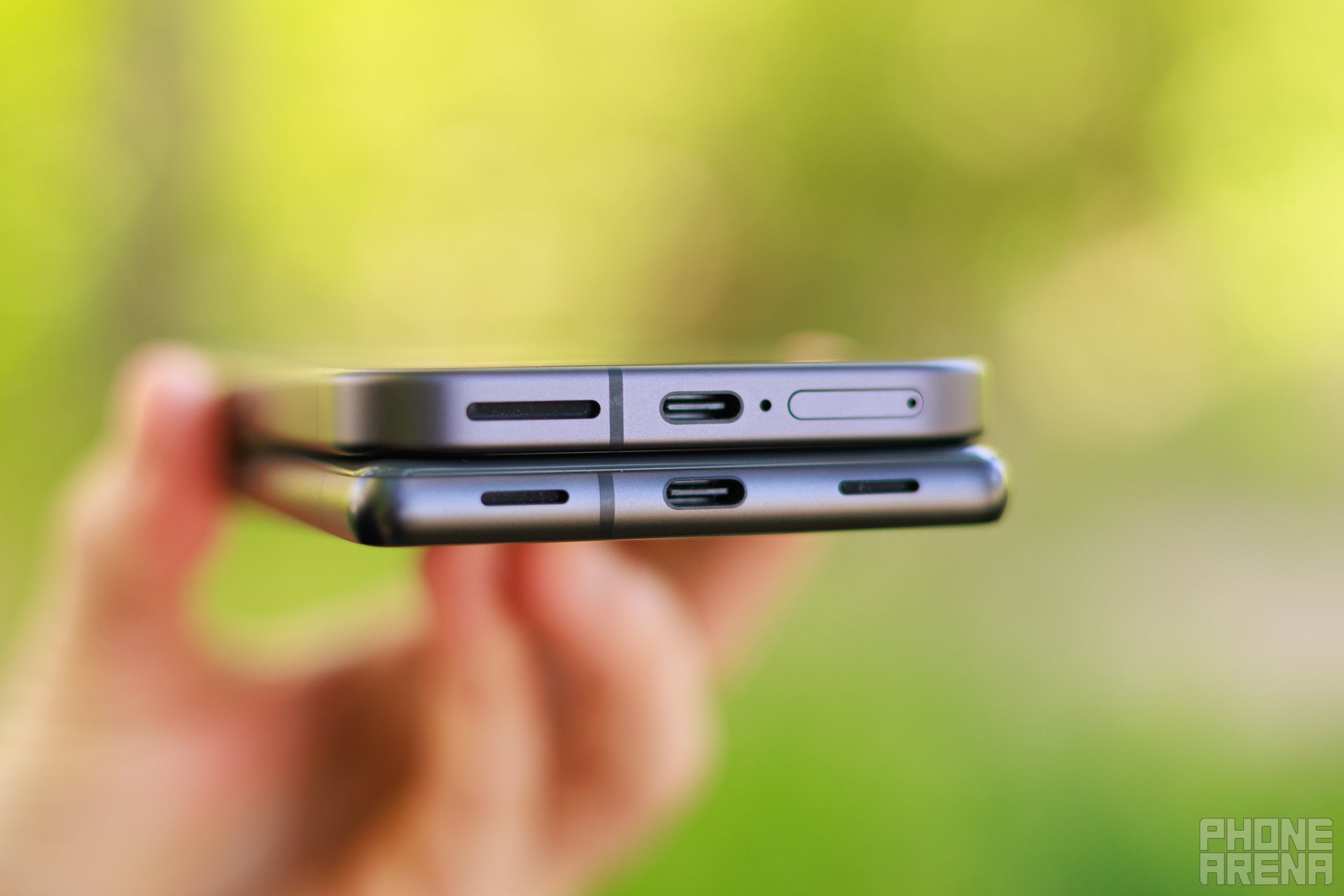
Image by PhoneArena
The Pixel 9a has a larger 5100 mAh battery, which is significantly more than the 4385 mAh one in the Pixel 7a.
Thanks to the new battery size and the more power-efficient G4 chip, the 9a is rated for 30+ hours of battery life on Google's website, compared to the 24+ hours of the Pixel 7a. In fact, Google claims the Pixel 9a has the longest battery life of all Pixel phones available right now.
Google also states that the 9a can last up to 100 hours if you use the Extreme Battery Saver feature, whereas the 7a is rated to last up to 72 hours with it.
The wired charging speeds have also increased with the 9a, which supports 23W vs the 18w on the 7a.
PhoneArena Battery and Charging Test Results:
One of the best parts about the Pixel 9a is its battery life, and you can clearly see how much the new model has pulled ahead of its older predecessor. We estimated nearly 2 hours more battery life on the 9a, which lasted significantly more during our Gaming and Browsing tests.
Also read: Google Pixel 9a battery
Specs Comparison
Here's a quick overview of the Pixel 9a vs Pixel 7a specs.
| Pixel 9a | Pixel 7a |
|---|---|
| Size, weight 154.7 x 73.3 x 8.9 mm, 186 g | Size, weight 152 x 72.9 x 9 mm, 193.5 g |
| Screen 6.3" OLED 120Hz 2700 nits | Screen 6.1" OLED 90Hz 200 nits |
| Processor Tensor G4 4nm | Processor Tensor G2 5nm |
| Versions: 8/128 GB 8/256 GB | Versions: 8/128 GB |
| Cameras: 48 MP main 13 MP ultra 13 MP front | Cameras: 64 MP main 13 MP ultra 13 MP front |
| Battery: 5100 mAh | Battery: 4385 mAh |
| Charging: USB-C 23W wired 7.5W wireless | Charging: USB-C 18W wired 7.5W wireless |
Also read:
So, to summarize these spec sheets, we are looking at an increase in battery size, a new main camera, additional storage option, two-generations newer chipset and an improved display. In other words, in just two years Google has upgraded every part of its more affordable phone series.
Summary
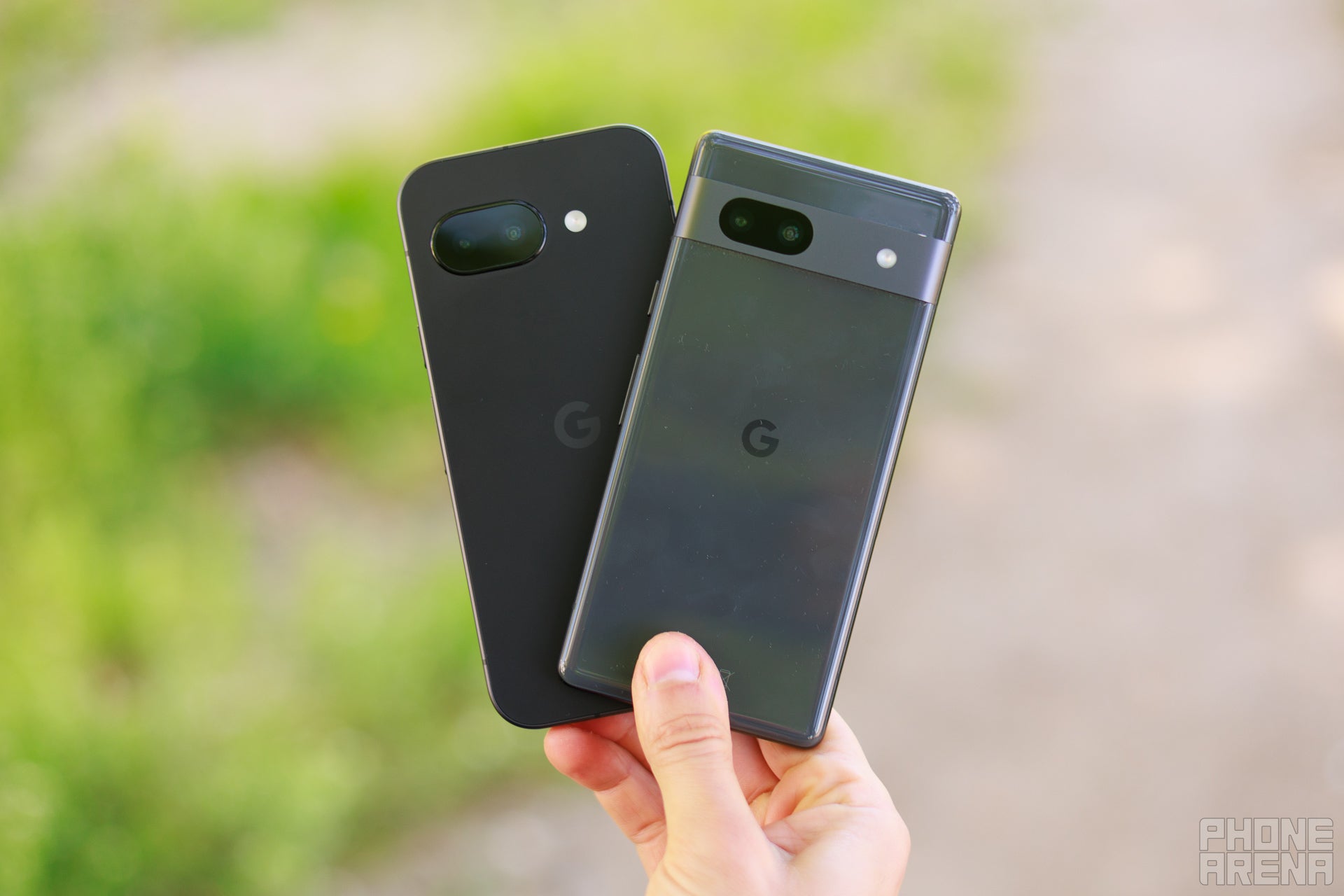
Image by PhoneArena
The Pixel 9a is a clear and comprehensive upgrade over the Pixel 7a. It introduces improvements in nearly every area — from its larger and brighter 120Hz display to a redesigned chassis that looks and feels more modern.
Under the hood, the move to the Tensor G4 chipset brings better power efficiency and significantly stronger GPU performance, while battery life has taken a major leap forward thanks to the new 5100 mAh cell.
And even though the camera upgrade is not noticeable in day-to-day use, the Pixel 9a unlocks features previously limited to premium Pixels, such as Macro Focus with 4K video and the new Gemini Live capabilities.
And even though the camera upgrade is not noticeable in day-to-day use, the Pixel 9a unlocks features previously limited to premium Pixels, such as Macro Focus with 4K video and the new Gemini Live capabilities.
Combined with a cleaner design, IP68 durability, and the still very affordable starting price of $499, the Pixel 9a easily earns its place as the best value Pixel yet — a worthy successor of the 7a.
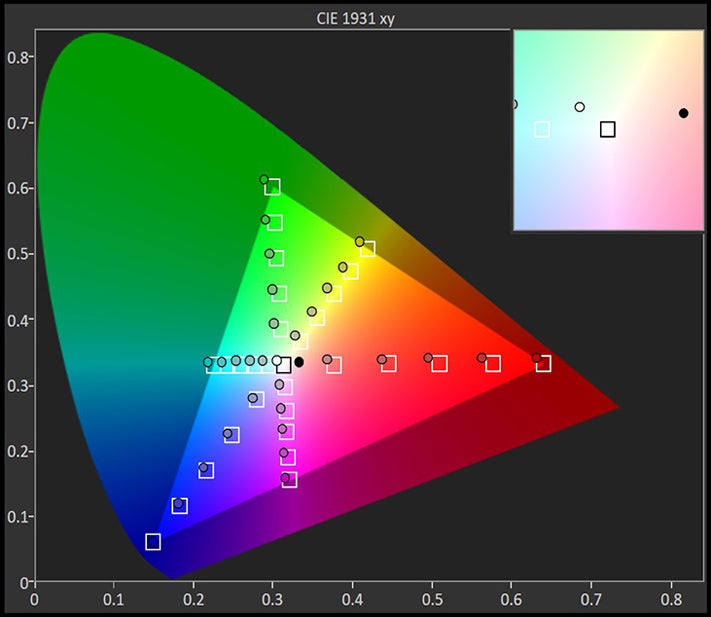
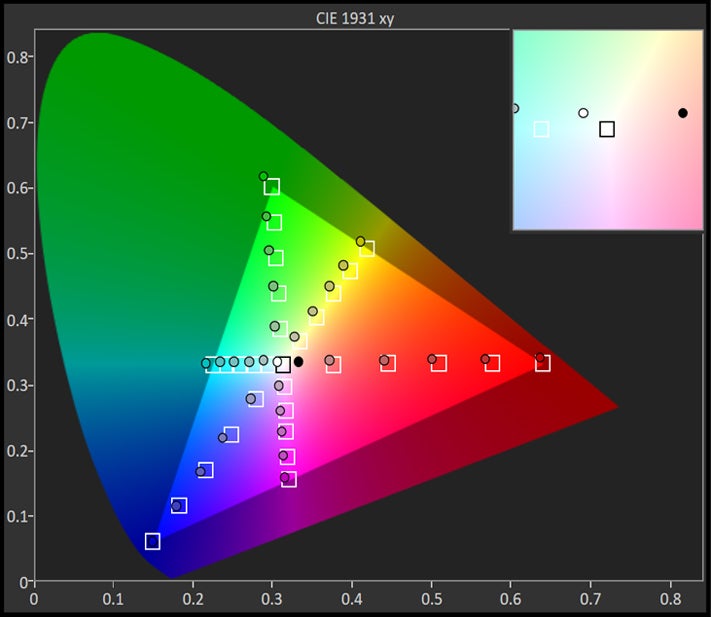










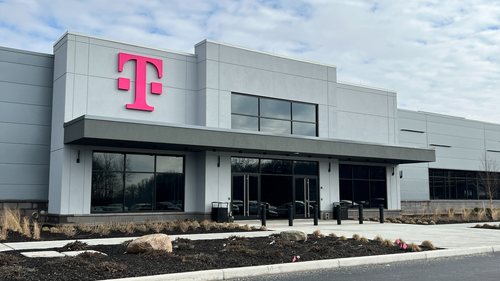

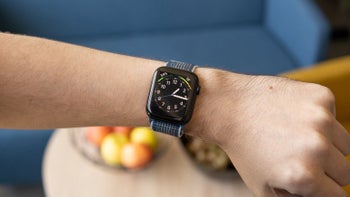


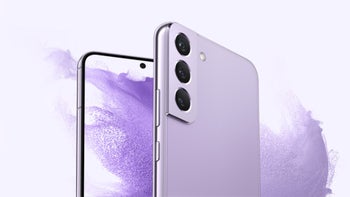
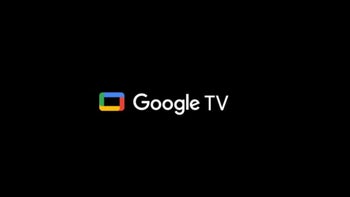
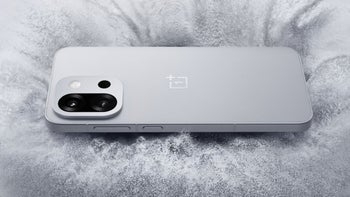






Things that are NOT allowed: